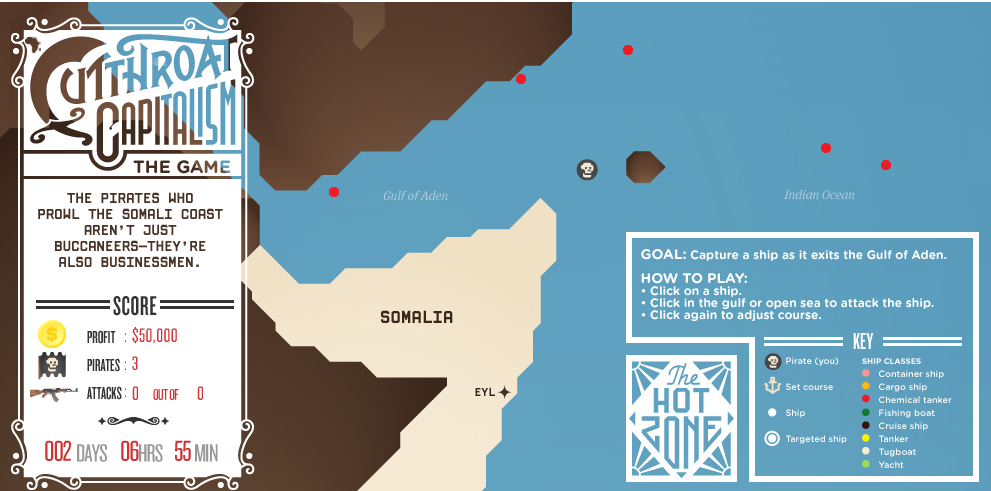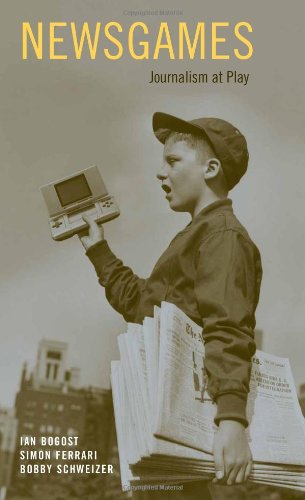Marcus Bösch: Newsgames let your audience play with news
 From a playable political cartoon to a simulation of Osama bin Ladens death – newsgames are embraced by the media to playfully engage the audience in important events. In other words, newsgames are games put to use in the context of journalism.
From a playable political cartoon to a simulation of Osama bin Ladens death – newsgames are embraced by the media to playfully engage the audience in important events. In other words, newsgames are games put to use in the context of journalism.
“Newsgames will not replace classical approaches to news but they can and will enhance and augment digital journalism in the 21st century,” says Marcus Bösch. 
The freelance journalism trainer has led numerous workshops for DW Akademie and is the co-founder of The Good Evil game studio. DW Akademie’s Natalia Karbasova spoke with Marcus Bösch about the idea behind newsgames, best practices and the future of newsgames.
How can newsgames be helpful for media outlets?
Newsgames can provide playful and interactive experiences that help explain, clarify or strengthen journalistic arguments – whether a simulation of complex scientific issues, a playable version of the national budget or an interactive political commentary. Games are very strong when it comes to explaining systems while traditional ways of reporting are very good at telling stories. Another huge advantage is that games are truly interactive. They show their unique strength when you compare them to the so-called webdocs make when it comes to interactivity. Good games engage players, keep them busy and let them learn something.
Do newsgames have to be as elaborate as video games?
I was very critical with all the existing examples I saw until I heard the arguments of the game designer Eric Zimmerman at this year’s Games for Change festival. Zimmerman argued that we don’t look for the same kind of world-changing effects from documentary films or books, and we don’t discuss bookification or the merit of books as educational tools. He argued that video games do not deserve this kind of scrutiny, and holding them to these higher standards is ‘like saying a medical simulation for training doctors should also cure cancer’. That actually convinced me. The genre is still in the making and I applaud nearly every attempt ever taken to push things forward.
Where can you learn more about newsgames?
Florent Maurin´s List is a good starting point. Apart from that, I like Thomas Rawlings’games. Gonzalo Frasca who somewhat coined the whole concept should be on the list as well. And then there’s Wired´s Cutthroat Capitalism, a gamelike economic analysis of the Somali pirate business model.
 There’s also a game Could you be a medallist by The Guardian, in which anyone can compare their performance in four Olympic disciplines with that of top athletes of different years. You could also check Moral Kombat, the Obama vs Romney debate game by the Huffington Post and a fun interactive article Just One More Game by the New York Times.
There’s also a game Could you be a medallist by The Guardian, in which anyone can compare their performance in four Olympic disciplines with that of top athletes of different years. You could also check Moral Kombat, the Obama vs Romney debate game by the Huffington Post and a fun interactive article Just One More Game by the New York Times.
For those interested, I would recommend the book Newsgames. Journalism at Play.
What’s going on in the international newsgames community?
As far as I can say, Germany is a blind spot when it comes to newsgames. I do not know of any German newsgames that have been developed in the last years and I don’t know of any media outlets really digging into it.
Maybe this will all change after several events this year with the RTL Summer School focusing on the topic, a newsgame-panel on the Gamescom and this year’s Scoopcamp.
Internationally, the situation is quite different. Different US and UK media outlets have been trying out the concept for years. There was a huge Hackathon at the New York Times headquarters in April and you have developers like Game The News in the UK. There is also a strong Brazilian newsgames community and the newspaper Le Monde in France has accomplished a newsgame, to name a few.
What knowledge and technical skills does a media outlet need to develop newsgames?
Many modern media outlets bring together programmers and members of the editorial team. To accomplish a game, you need a game designer who develops the idea, a programmer who makes things work technically and a designer who makes things look good. When it comes to newsgames, an editor and a game designer should work on the concept together in order to choose suitable game mechanics.
What are the main components a game should posess in order to be popular with the public?
Is journalism supposed to be popular? In my opinion, a good newsgame like a great piece of traditional journalism should provide you with new insights, a learning and a crucial experience. The major goal of a newsgame is not necessarily to attract millions of players. Even though a fitting game mechanic smartly implemented that supports intrinsic motivation via meaning, mastery and autonomy can help.
What are typical mistakes which occur while producing newsgames?
The most important lesson is: Not everything is a game nor can it be squeezed into the concept of a game. Another common mistake is to underestimate the effect of a suitable game mechanic. The mechanic is the core carrier of meaning. Apart from that it is very easy to get lost in the ever-nerv-wrecking triangle of cost, time and quality. If your game copes with actual news it should not take months to finish it.
Does the development of new devices like Google Glass bring new perspective to newsgames?
I am convinced that everything is or will be mobile pretty soon depending on the place on earth where you stand. I do not know if Google Glass can really catch up to the hype there is right now. There have already been attempts to use Google Glass for newsgames – even though these are very early ideas. Mobile and or wearable devices bring great opportunities for gaming in general and I’m very curious to see who will succeed embracing these new chances. Next to wearable devices sensors, drones provide even more ways for adding game mechanics to ordinary things like, let’s say, jogging.
What is in your opinion the future of newsgame?
Right now the usage of games spreads outside the bounds of the traditional games industry. Games and simulations are already used for training, education and preparation for future wars while the buzzword gamification startles advertisers and businessmen. It sounds strange to me that journalism of all things should remain one of the few spots that is not touched by games at all.
While adopting new and crucial rules and ways of doing journalism in the 21st century media outlets should embrace games in order to be capable of providing meaningful and interactive experiences. I‘m sure that we will see more trial and error in order to experience stunning new ways of journalism pretty soon.




Feedback